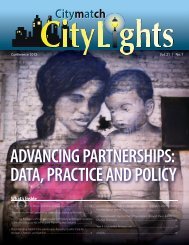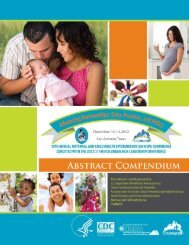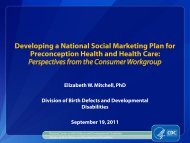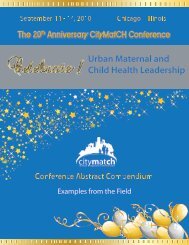Conference Abstract Compendium Examples from the ... - CityMatCH
Conference Abstract Compendium Examples from the ... - CityMatCH
Conference Abstract Compendium Examples from the ... - CityMatCH
You also want an ePaper? Increase the reach of your titles
YUMPU automatically turns print PDFs into web optimized ePapers that Google loves.
2009 <strong>CityMatCH</strong> Urban MCH Leadership <strong>Conference</strong>Results <strong>from</strong> a pre-hurricane maternal child health preparedness focus groupPRIMARY CONTACT:Mirine R Dye, MPHFlorida International University134 Harbor DrTavernier, FL, 33070Phone: (305) 852-3601Fax: (305) 233-8300Email: mirine@bellsouth.netCATEGORYO<strong>the</strong>r: PreparednessFOCUSProgram Policy FocusCO-PRESENTER(S)/AUTHOR(S):Anamarie Garces deMarcilla,agarces@med.miami.edu (Author)Lena Camperlengo, LCamperlengo@cdc.gov(Author)OBJECTIVEPreparedness efforts have rarely included pregnant and lactating women with young children. Thisvulnerable population is not targeted with preparedness information specific to <strong>the</strong>ir situation. Thisresearch sought to provide inputs as about health behavior and intent (prospective) with this vulnerablepopulation. Lessons <strong>from</strong> Hurricane Katrina in New Orleans in 2005 and <strong>the</strong> many hurricanes that havehit <strong>the</strong> Florida Keys have clearly demonstrated that women and families need specific instructions when adisaster hits <strong>the</strong>ir homes. What do pregnant, lactating and parenting women (with children under age 3)living in <strong>the</strong> Florida Keys know about emergency preparedness?METHODSTen English speaking pregnant women or women with a child under <strong>the</strong> age of three in <strong>the</strong> home wererecruited <strong>from</strong> a local new mo<strong>the</strong>r support group. Data was collected with <strong>the</strong> use of a transcriptionist andback up audio, and <strong>the</strong>n reviewed by <strong>the</strong> principal investigator. Participants received a $25 gift card to alocal grocery retailer for participation, lasting approximately an hour and half.RESULTSThe results of <strong>the</strong> (n=7) women participating in <strong>the</strong> focus group suggest that pregnant, lactating andparenting women in <strong>the</strong> Florida Keys may be unprepared for an emergency such as a hurricane and do nothave adequate plans for childbirth delivery, feeding and caring of <strong>the</strong>ir infants when impending hurricanemandates evacuation or shelter in place. Family “rules” for evacuation often do not match those practicedin <strong>the</strong> region by emergency planners, and unlikely sources for information emerged as common<strong>the</strong>mes.CONCLUSIONSPregnant, lactating women and young families parenting infants represent a vulnerable population oftenoverlooked by disaster planners. This project assessed <strong>the</strong> level of readiness and identified trustworthycommunication sources in a disaster by conducting a focus group of <strong>the</strong> local target population in <strong>the</strong>Florida Keys.128







